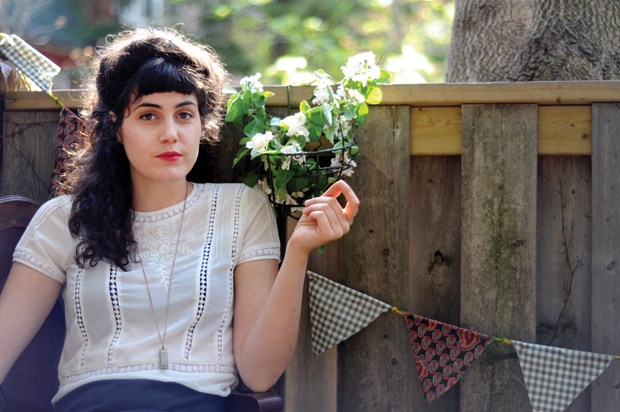Sarah Jane Scouten and The Honky Tonk Wingmen, Dec. 13 at 7 p.m., Cates Hill Chapel, Bowen Island. Tickets $15 adv./$20 dr. For more information visit sarahjanescouten.com.
Visiting a heritage town in the East Kootenay region of B.C. is not a hard sell for folk musician Sarah Jane Scouten. The town, called Fort Steele, is the sort of old-timey place that seems like it could have come from one of her songs.
Scouten and her band, The Honky Tonk Wingmen, are wrapping up a 21-date tour of Alberta and B.C. The group just played in Nelson and are heading up to Ymir, B.C. for a show later that evening. Scouten says a highlight of this tour has been discovering Fort Steele, a place that has went from being a gold rush town to a ghost town to a tourist attraction over its 150-year history. She excitedly describes the heritage town and its many unique buildings. "There's an old theatre," she says. "There's a photo emporium we went to, like an old saloon, and you go and take a bunch of photos. So we made a silent film the other day actually."
Scouten's interest in traditional, honky tonk activities like this isn't usual. In fact, you could say it's part of what defines her as an artist.
Born in Vancouver, Scouten spent her formative years living on Bowen Island and commuting to West Vancouver secondary. Growing up on Bowen Island, she says, influenced her appreciation of music from a young age. "As someone with an artistic tendency, I was exposed to so many other artistic types. I think Bowen Island has got like the top five artist density in Canada," she says. Scouten says her father was a bluegrass banjo musician and seeing him and his friends play night after night was how she learned music. "Often times it was too much effort to go into the city to hang out with friends, so I'd just spend time with my dad and his friends and play music. I kind of cut my teeth that way," she says.
While Scouten describes Bowen Island as "idyllic", she admits it could be very isolating living on an island and says as a teenager she often felt restless.
Scouten, who has been writing songs in a serious way since 2009, went on to explore Vancouver in an effort to hone her craft. When she discovered the city lacked a serious folk community, she started one herself with a monthly folk music revue called Black Strap Sadie's Old Time Jamboree, which was hosted at a venue on Main Street.
"I didn't really realize what a beautiful thing we had," she says of the revue. "Every time we'd be sold out, there'd be people spilling out into the street. That's when I guess I started to maybe become more of a budding professional musician. But I made tons of mistakes; I kind of cringe at the thought of the way I sang or the leads in the songs I sang back then."
Like many ambitious artists, Scouten eventually set off for Montreal, and this is where she says she became a professional musician. "Montreal treated me really well and because it's so affordable and so artist-friendly I was able to spend a lot of time honing my craft and learning from a lot of people," she says.
In 2011, she recorded and released an album at the behest of a friend who was studying audio acoustics at Concordia University. "I kind of had a band that fell in my lap," she says. "That's how it kind of started. It was gradual, never particularly intentional."
The rest is history. Scouten and her bandmates now tour extensively around Canada and the U.S. She says a new album is coming out next year.
When Scouten isn't touring she spends most of her time in Toronto these days. She's quick to say, however, that she's a British Columbian first, not an Ontarian. Her musical style draws from all aspects of Canadian geography, but her lyrics often focus westward. "I tend to write about Western Canada," she says. "Cowboys and hard rock mining settlers - maybe the music of those people."
Scouten may be described as a country artist, but she says her style is more diverse. "I'm kind of a meat grinder of Appalachian string band music, classic country music, and then the legacy of Canadian songwriters," she says. Scouten's music, though, has its roots in folk, and she says that Canadian folk should deal with issues relevant to the country. She says that Canadian folk music should be about "making our culture lyrical."
Scouten's latest album, 2014's The Cape, explores family dynamics and personal relationships, topics Scouten doesn't want to discuss any further for fear of upsetting the real-life individuals. The album, she says, also looks at things that have changed, such as Cape Roger Curtis, a 600-acre patch of wilderness on Bowen Island that was turned into luxury residences by developers. "It was hard for a lot of Bowen Island residents to see that being developed because we had just kind of had free run of the place," she said.
Despite this, Scouten claims that Canadian folk music doesn't overly glorify the past.
"Canadian's will do it in a subtler, maybe less nationalistic way. But still doing it as an affection of where we're from rather than a glorification. I think that might be what distinguishes Canadian folk music," she says.
She admits she can envision a time where she's no longer a professional musician, perhaps burning out due to road-weariness and a lack of financial stability. But that time hasn't arrived yet.
"Fortunately my music career keeps getting better and better so it's kind of like this compass that tells me 'keep following north.' I don't have to question so much anymore,” she says.



